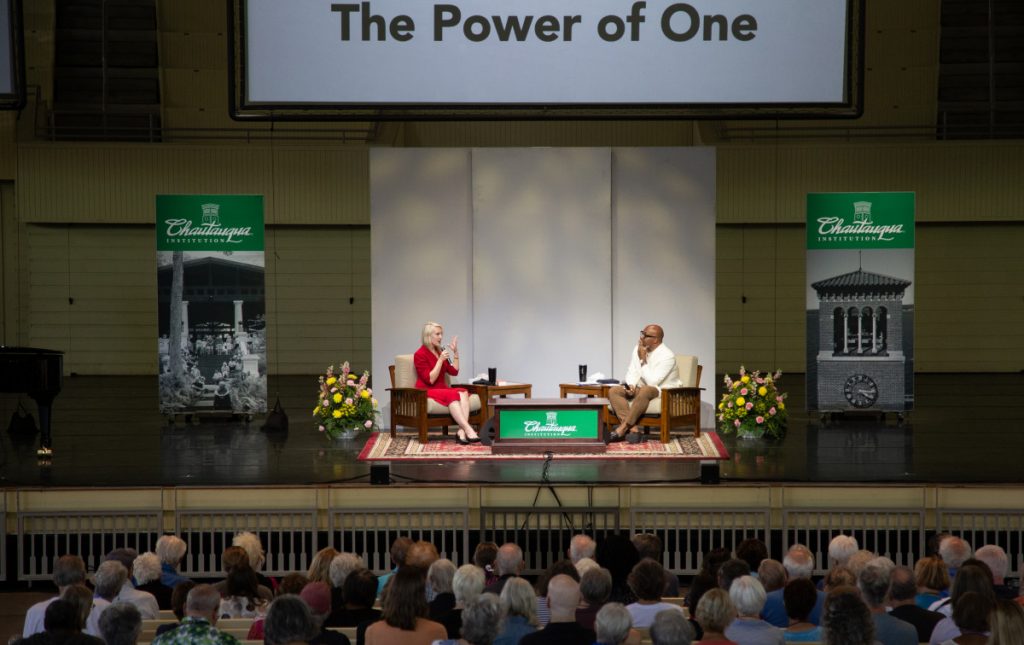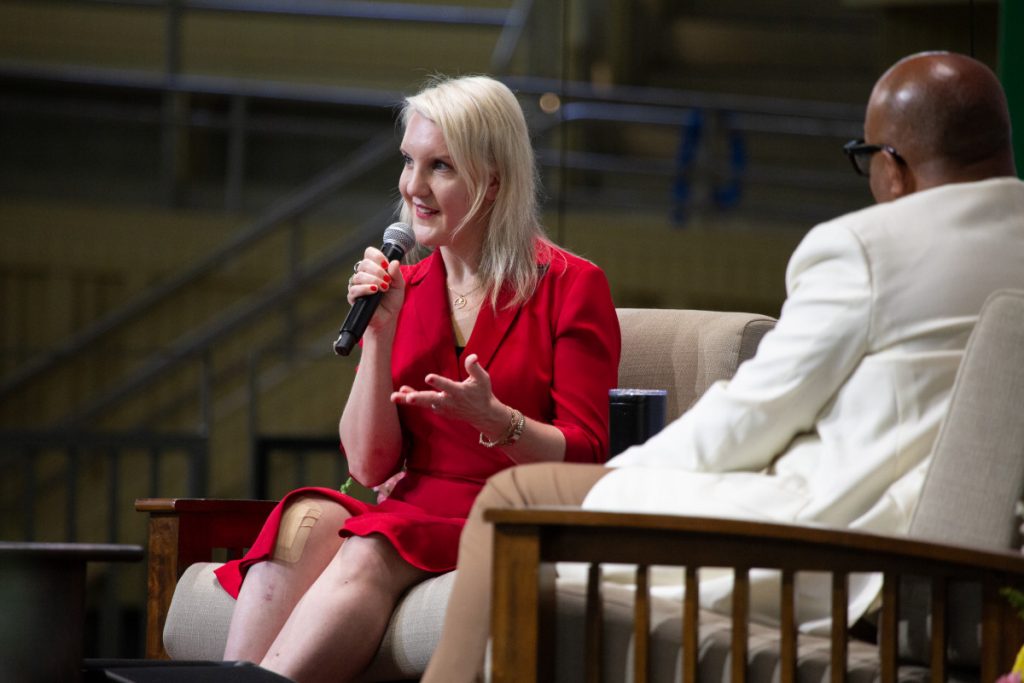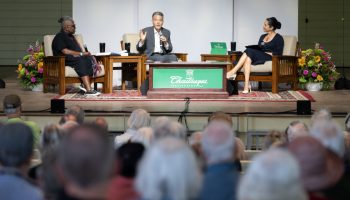

Megan Brown
Staff Writer
As Ada Calhoun arrived at Chautauqua Institution on Monday, a question burned in her mind.
“Is this a cult?” she asked. “I would like to join whatever it is. Just let me know how.”
Calhoun joined Kwame Alexander at 10:45 a.m. Tuesday in the Amphitheater as part of Chautauqua Lecture Series’ Week Seven theme, “Kwame Alexander and Friends: The Power of One.” The pair discussed growing up, their parents and Calhoun’s writing journey.
Calhoun has published five books under her own name and ghostwritten many more. She is the author of Crush, a novel; Also a Poet, a biography of Frank O’Hara and a memoir about her and her father; and Why We Can’t Sleep, an exploration into what keeps Gen X women up at night.
Since November 2023, Alexander has served as the Michael I. Rudell Artistic Director of Literary Arts and Inaugural Writer-in-Residence. As part of his work at Chautauqua, he helped craft the Week Seven theme — and people have been curious about what “the power of one” means.
For Alexander, “the power of one” is the idea that “one person can impact the life of many people, that one person can actually change the future.”
An example of that kind of person is Bella, whom Alexander met on Monday and characterized as a “curious, smart, thoughtful, always-smiling kid.”
“I remember leaving Bella, and walking around Chautauqua just smiling, like I was a grandparent who had just figured out FaceTime,” Alexander said. “The smiling is contagious. And I think, for me, that’s the power of one to influence many.”
When Calhoun thinks about “the power of one,” she is reminded of a talk she heard Marilynne Robinson give.
“Puritans believe we are judged twice: once upon our death and then once when the effects of every decision we make play out,” she said. “… You never know what the choices you make are going to do, how they are going to reverberate through time and through people that you love and care about.”
Growing up as the daughter of an actress and an art critic in the midst of New York City, Calhoun imagined escaping to the countryside.
“I wanted nothing to do with (my father’s) world,” she said. “I wanted to be a farmer.”
However, that dream was short-lived.
“Then I worked on farms, and I did not like it very much,” she said.
She pivoted to Sanskrit, where she thought she could realize her love of grammar as a translator.
While she was in school at the University of Texas at Austin, she took a job as a journalist for The Austin Chronicle to support her Sanskrit habit.
“I basically said, ‘I’ll do whatever you want,’ ” she said. “They had me review books. They had me review theater. I was a photographer for a while, and it was so incredibly fun.”
From there, she became an editor, wrote a parenting-related book for the magazine at which she worked (which, she said, she leaves off her resume) and then a publishing house asked her to ghostwrite. After being a ghostwriter, she started to write her own nonfiction books, starting with St. Marks Is Dead. In 2025, her debut novel Crush hit the bookstores.
When the “Today” show asked Alexander to pick five books he loved, Crush was included on that list. Alexander read the first draft of his review: “Crush is a memoir about the dissolution of Ada Calhoun’s 20-year marriage. This is a love story, but it’s an unusual one. While Calhoun and her husband have an active sex life, they rarely kiss —”
“— It’s a novel, you guys,” Calhoun said.
Calhoun had watched the clip of the “Today” show in which Alexander discussed the book. While Alexander was excited to talk about Crush, his cohosts had a different reaction.
“The other people on the show were horrified. … I have a screengrab of their faces just looking very confused and displeased,” she said. “Thank you for championing a book that was probably difficult for your cohosts.”
Calhoun sees Crush fitting into the narrative of “The Power of One” because the narrator rediscovers herself throughout the book.
Much like Calhoun, the unnamed narrator puts others before herself — perhaps to a fault.
“I took pride, as my narrator did, in always doing the right thing and then being faithful and true and responsible. And what she finds is that what that tends to get you is very distant from your own desires, from your own self,” Calhoun said. “If you’re always serving other people, you’re always trying to manage other people’s feelings, what can happen is you forget how to have fun, what you actually enjoy.”
When Alexander was 12, he remembers coming home from vacation Bible school and finding the car fully packed. As he, his sisters and his mom left in the car, Alexander wondered where they were going.
“We’re going to stay in a hotel, and we’re leaving your father,” his mother had said.
Alexander sobbed and demanded that his mother call his dad to make things work. Although Alexander is unsure if his mom actually called his dad when she got out of the car, they did return home. After Alexander’s youngest sister graduated from college, his mom left his dad, moving a block away from the home they had shared.
“Do you think that — I hate to make a general statement — but do you think that women tend to do that? Tend to sacrifice themselves to put other people ahead of themselves?” Alexander asked.
In her response, Calhoun drew from the knowledge she gained writing her book Why We Can’t Sleep. When Gen X women reached middle age, what lay before them wasn’t necessarily what they had been promised — there was a cost and “it is often sleeping,” she said.
Alexander empathized with feeling overwhelmed with concern. In recent days, his concern over the state of the United States has led him to consider leaving the country.
“(I’m) just becoming so disillusioned, fed up, afraid, worried about the state of our democracy, about the lives of friends and family,” he said. “Then I began to think, Ada, about the people who came before us and how they resisted and how they fought back and how they refused to give up.”
When Calhoun feels this way, she looks to the philosophy of Mister Rogers: look for the helpers.
“The worse things get, the more I think it’s necessary to look at the people who are doing good and who are on the side of right and kindness and empathy and justice and to celebrate them,” Calhoun said. “I think sticking around to try to be one of those people, to be one of the helpers, and to celebrate other people who are doing that, I think is very important.”
Looking to music, whether writing it or being inspired by it, is one way to process tough feelings. One of the great artists of the 20th century, Joni Mitchell, turned to writing lyrics when processing upheaval in her own life.
Maritri Garrett, a singer and songwriter who led one of the Week Four Chautauqua Writers’ Center classes, came to the Amp stage to perform Mitchell’s “Both Sides Now.”
“I’ve looked at life from both sides now / From win and lose and still somehow / It’s life’s illusions I recall / I really don’t know life at all.”
Calhoun read a passage from Crush in which the narrator tells of her life with David, the man she loves.
“They say if Shakespeare plays, the way you know if one was a tragedy or a comedy is whether it ended with a death or a wedding. In life, it is harder to tell. Usually a wedding or pregnancy doesn’t wrap everything up in a bow of joy, so what does a truly happy ending look like? I think it’s always a surprise.”




